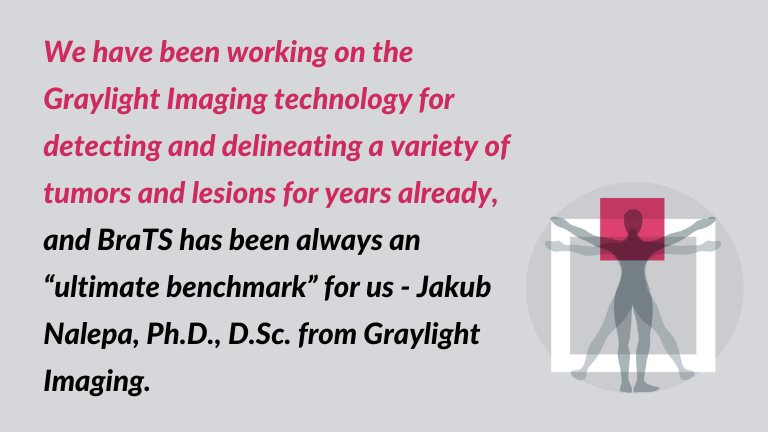BraTS 2025 – Another Challenge Success for the Graylight Imaging Team
The Graylight Imaging team won the first place in this year’s prestigious Brain Tumor Segmentation (BraTS 2025) Challenge. The results were announced during the 28th International Conference on Medical Image Computing and Computer-Assisted Intervention, held in South Korea. Maria Bancerek, Piotr Rudzki, and Jakub Nalepa represented Graylight Imaging.
Congratulations to the entire team on this outstanding achievement! We are proud and honored to have such top-tier professionals representing us on the international stage.
BraTS 2025 Challenge – A Global Benchmark in AI for Medical Imaging
The BraTS Challenge is one of the most important and recognizable events in the field of AI-based medical image analysis. It has a long-standing tradition, with the first edition taking place in 2012.
BraTS Lighthouse – An Expanded Challenge Format
This year, the organizers held the competition in a newly expanded format called BraTS Lighthouse, introducing additional tasks beyond the traditional focus on brain tumor segmentation. They also challenged participants with clinically relevant tasks such as assessing lesion progression and segmenting metastatic lesions.
Our team took on the Brain Metastasis Segmentation task and achieved the best result in this category.
We have been working on the Graylight Imaging technology for detecting and delineating a variety of tumors and lesions for years already, and BraTS has been always an “ultimate benchmark” for us. Detecting and tracking brain metastases is an extremely difficult and important clinical task, and we’re so happy to push forward what’s possible with AI. We strongly believe that the thoroughly validated AI models will change the way we see & treat the patients – comments Jakub Nalepa, Ph.D., D.Sc. from Graylight Imaging.

This Year’s Edition
In the 2025 edition of BraTS Lighthouse, participants could select from 11 challenges. Each challenge focused on one of three areas: the (sub)region segmentation (SEG), image synthesis (SYN), or classification (CLASS).
The Graylight Imaging team participated in the Segmentation of Pre- and Post-Treatment Brain Metastases (SEG) challenge.
Monitoring brain metastases is both time-consuming and labor-intensive, especially when multiple lesions are involved and manual techniques are used. Typically, brain metastases are assessed by measuring their largest unidimensional diameter. However, accurately estimating the volume of both the lesions and surrounding oedema is crucial for informed clinical decision-making and improved treatment outcomes.
The team’s goal was to develop a robust, machine learning–based algorithm capable of accurately identifying brain metastases of varying sizes in both pre- and post-treatment MRI scans.
Thanks to this AutoML technology, automatic segmentation of brain metastases (with special emphasis put on enhancing tumor) and associated edema and resection cavity can save physicians valuable time while delivering consistent, reproducible results.
Dataset for Algorithm Development
Participants worked with a dataset comprising pre- and post-treatment brain MRI scans collected from multiple institutions under real-world clinical conditions. Due to variations in equipment and imaging protocols, the dataset featured a wide range of image quality—reflecting the diversity of everyday clinical practice.
Our History with BraTS – A Quick Recap
This is not our first success in the BraTS competition. With nearly two decades of experience in medical image analysis, we’ve participated in several editions since our debut in 2017.
In 2021, our data scientists placed 6th (and 5th after the validation phase)—a major achievement that confirmed the world-class quality of our work.
We performed even better in 2022, when we entered two competitions: the Brain Tumor Segmentation Challenge 2022 and the Federated Tumor Segmentation Challenge 2022 (FeTS). In the latter, which required evaluating algorithm performance on out-of-sample data in a federated setup, our team secured an impressive second place.
Artificial Intelligence in the Service of Medicine
We strongly believe that innovative technologies play a key role in improving cancer care. AI can assist in detecting even the smallest brain lesions, supporting physicians in diagnosis and treatment planning.
Artificial intelligence in oncology enables the precise measurement of tumors and analysis of numerous tumor characteristics. While there’s still much work to be done, the development of AI-powered algorithms is already having a real, positive impact on treatment outcomes.
Resource: